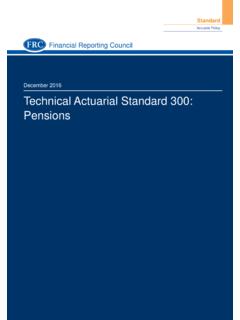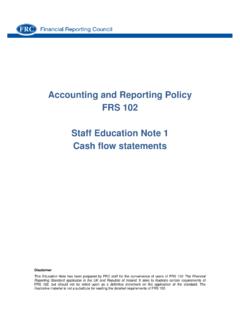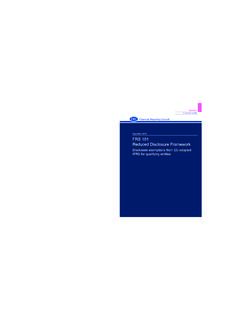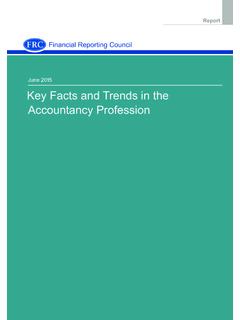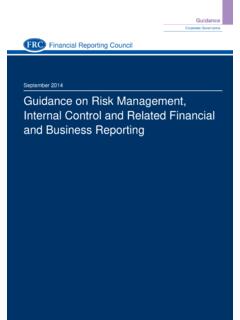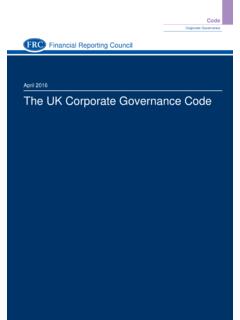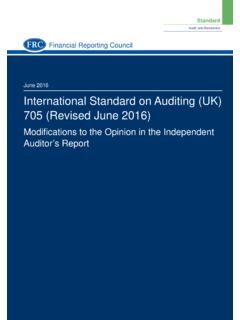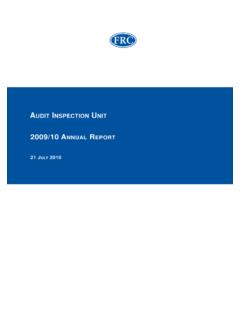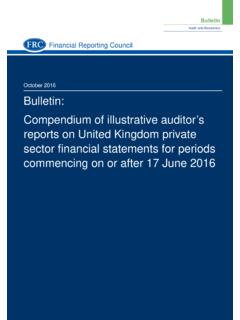Transcription of Revised Ethical Standard - Financial Reporting Council
1 StandardAudit and AssuranceJune 2016 Revised Ethical Standard 2016 Financial Reporting CouncilThe FRC s mission is to promote transparency and integrity in business. The FRC sets the UK Corporate Governance and Stewardship Codes and UK standards for accounting and actuarial work; monitors and takes action to promote the quality of corporate Reporting ; and operates independent enforcement arrangements for accountants and actuaries. As the Competent Authority for audit in the UK the FRC sets auditing and Ethical standards and monitors and enforces audit FRC does not accept any liability to any party for any loss, damage or costs howsoever arising, whether directly or indirectly, whether in contract, tort or otherwise from any action or decision taken (or not taken) as a result of any person relying on or otherwise using this document or arising from any omission from it.
2 The Financial Reporting Council Limited 2016 The Financial Reporting Council Limited is a company limited by guarantee. Registered in England number 2486368. Registered Offi ce: 8th Floor, 125 London Wall, London EC2Y 5 ASETHICAL Standard (2016) INTEGRITY, OBJECTIVITY AND INDEPENDENCE Contents page Introduction Scope of this Ethical Standard 6 Investment Circular Reporting Engagements 7 Meeting the Ethical Outcomes Established by the Overarching Principles, Supporting Ethical Provisions and Specific Requirements 7 The Third Party Test 8 Threats to Integrity, Objectivity and Independence 9 The EU Audit Directive and Regulation 10 Definitions 10 Part A Overarching Principles and Supporting Ethical Provisions Integrity and Objectivity 12 Overarching Principle 12 Supporting Ethical Provisions 12 Independence 12 Overarching Principle 12 Supporting Ethical Provisions 13 Part B Section 1 General Requirements and Guidance Compliance 17 Ethics Partner 19 Breaches 21 2 Non-involvement in Management Decision-taking 22 Identification and Assessment of Threats 23 Threats to Integrity.
3 Objectivity and Independence 23 Investment Circular Reporting Engagements 29 Identification and Assessment of Safeguards 30 Other Firms Involved in Engagements 32 Engagement Quality Control Review 32 Overall Conclusion 32 Communication with Those Charged With Governance 33 Documentation 36 Effective Date 38 Section 2 Financial , Business, Employment and Personal Relationships Financial Relationships 39 General Considerations 39 Financial Interests Held as Trustee 44 Financial Interests Held by Firm Pension Schemes 45 Loans and Guarantees 45 Business Relationships 46 Employment Relationships 49 Management Role with an Entity Relevant to an Engagement 49 Loan Staff Assignments 49 Partners and Engagement Team Members Joining an Entity Relevant to an Engagement 50 Family Members Employed by an Entity Relevant to an Engagement 54 Governance Role with an Entity Relevant to an Engagement 55 Employment with the Firm 56 Financial Reporting Council 3 Family and Other Personal Relationships 56 External Consultants Involved in an Engagement 57 Section 3
4 Long Association with Engagements and with Entities Relevant to Engagements General Requirements 59 Public Interest Entities and Other Listed Entities 61 Audit Firm Rotation 61 Key Audit Partners and Engagement Partners 61 Engagement Quality Control Reviewers and Other Key Partners Involved in the Engagement 63 Other Partners and Staff Involved in the Engagement in Senior Positions 64 Section 4 Fees, Remuneration and Evaluation Policies, Gifts and Hospitality, Litigation Fees 65 Remuneration and Evaluation Policies 74 Gifts and Hospitality 76 Threatened and Actual Litigation 76 Section 5 Non-audit / Additional Services General Approach to Non-audit / Additional Services 78 Investment Circular Reporting Engagements 78 Identification and Assessment of Threats and Safeguards 82 Threats to Objectivity and Independence 84 Safeguards 85 Communication with Those Charged With Governance 87 Documentation 87 Audit Related Services 88 Evaluation of Specific Non-audit Services and Additional Services 89 4 Internal Audit services 91 Information Technology Services 94 Valuation Services 95 Actuarial Valuation Services 96 Tax Services 97 Litigation Support Services 102
5 Legal Services 103 Recruitment and Remuneration Services 103 Corporate Finance Services 105 Transaction Related Services 107 Restructuring Services 109 Accounting Services 112 Prohibited Non-audit Services for Public Interest Entities 115 Section 6 Provisions Available for Audits of Small Entities Introduction 119 Alternative Provisions 120 Economic Dependence 120 Self-review Threat Non-audit Services 120 Exemptions 121 Management Threat - Non-audit Services 121 Advocacy Threat Non-audit Services 121 Partners and Other Persons Approved as a Statutory Auditor Joining an Audited Entity 122 Disclosure Requirements 122 Appendix: Illustrative template for communicating information on audit and non-audit services provided to the group 124 Financial Reporting Council 5 PREFACE The FRC s Ethical Standard applies in the audit of Financial statements and other public interest assurance engagements.
6 It is read in the context of the Statement The Financial Reporting Council Scope and Authority of Audit and Assurance Pronouncements which sets out the application and authority of the FRC s Ethical Standard . The terms used in the FRC s Ethical Standard are explained in the Glossary on the FRC s website. The FRC s Ethical Standard applies to audits of Financial statements and other public interest assurance engagements in both the private and the public sectors. 6 Introduction Scope of this Ethical Standard I1 This Ethical Standard applies to audit engagements and other public interest assurance engagements1. The term engagement is used in this Ethical Standard specifically to mean an audit engagement or other public interest assurance engagement, or both where the context permits, unless stated otherwise.
7 A fundamental objective of any such engagement is that the intended users trust and have confidence that the audit or assurance opinion is professionally sound and objective. This in turn should enhance the credibility for users of the information the opinion covers (the subject matter information 2 in the case of an audit engagement, the Financial statements). It should also enhance the intended users understanding of the underlying subject matter ( in the case of an audit engagement, the historical Financial position and performance of the entity). I2 Users are neither responsible for the subject matter information nor for the underlying subject matter of the engagement. Their interest in the engagement usually arises because they have an actual or prospective stake in an entity relevant to the engagement but do not have direct access to the subject matter.
8 I3 Although auditors and assurance practitioners are Reporting to users, they are generally engaged to do so by the entity whose information they are Reporting on. Accordingly their contractual client (the entity) is different to their beneficial client (the users). These principal-agent relationships (where the users are the principals and the directors and auditors of the entity their agents) give rise to the potential for conflicts of interests that need to be addressed if the user is to have trust and confidence in the audit/assurance process, the subject matter information and the directors of the entity itself. Regulation and oversight of audit and assurance practitioners, including professional and Ethical codes and standards , addresses the need for trust and confidence between users and practitioners.
9 The engagement then addresses the need for trust and confidence between the users and the directors of the entity. 1 Audits of Financial statements(*) undertaken in compliance with International standards on Auditing (ISAs) (UK) and other engagements undertaken in compliance with performance standards issued by the FRC which, as of 17 June 2016, comprise: a. Reporting accountants acting in connection with an investment circular (the standards for Investment Reporting SIRs ); b. Review of interim Financial information by the independent auditor of the entity (International Standard on Review Engagements (UK and Ireland) 2410); and c.
10 Engagements to provide assurance on client assets to the Financial Conduct Authority (the CASS Standard ). (*) In the public sector the statutory scope of an audit can extend beyond the entity s Financial statements to include Reporting on an entity s arrangements for the proper conduct of its Financial affairs, management of its performance or use of its resources. 2 Subject matter information is the outcome that results from the evaluation or measurement of subject matter against suitable criteria. More full definitions are given in the Glossary of Terms. Financial Reporting Council 7 I4 In the context of an engagement, such conflicts of interest create a potential risk (threat) that the practitioner s judgment or actions in conducting or determining the outcome of the engagement may be unduly influenced by interests other than those of the intended user (the beneficial client under the engagement).
